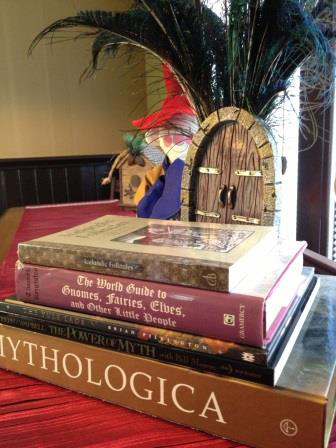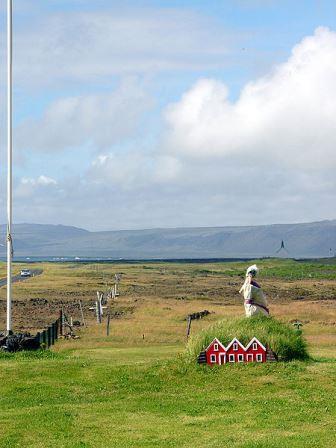How to live with elves

The huldufolk that lives in my house
Some days I’d like to trade-in my elves and huldufolk for a gerbil. Gerbils don’t steal my jewelry and socks. And probably, it’s a little less weird to see me talking to a gerbil than the invisible little folk that reside inside my house. I suppose it could be worse – I could have trolls. No, I’m not crazy. I’m just Icelandic.
Even though I’m third generation Canadian, I can’t escape my Icelandic roots. I grew up in Gimli, Manitoba the largest Icelandic community outside of Iceland, where it’s normal to lament elves, huldufolk (hidden folk), and trolls while you’re having your coffee cup read as you snack on putrid hard fish. When my ancestors came to Canada in the 1870s, the huldufolk tagged along fancying themselves Viking adventurers. Both had to modify traditions as they settled into a new way of life and married into Irish, Ukrainian and English families. Huldufolk typically live in open spaces near rock outcroppings but weather, cultural barriers and mosquitoes inspired them to move indoors and co-habitat with the Icelandic Canadians. And, when I moved to British Columbia, a few copped a ride in my suitcase, as they longed for an ocean view in a house that didn’t require triple pane windows. As for the elves, they came with the house.
Huldufolk are not bad housemates if you give them some space and respect. They’re a bit mischievous but lore says they bring good luck (I’ll confirm that when I win Lotto Max!). You can tell they are around when things are moved or disappear and reappear. When something goes missing, it’s always best if you compliment your huldufolk about how clever they are, and then patiently wait. Eventually it will return, typically in the same spot you last saw it. If you’re desperate for its return, you can try negotiating a trade for an even shinier object. But, if you become impatient and offend or threaten them, you might be waiting a long, long while. Or worse, another item disappears, splinters become a little too common, or the dog’s tail gets pulled, a lot.
In Iceland, things are taken to a whole other level where sensitivity to elves and huldufolk are a huge consideration in everything from narrowing or routing roads around sacred boulders to property allotments for the invisible folk. They have even been known to delay construction long enough to give non-human constituents time to find new accommodations. The government respects the belief system of its people no matter what it might seem like to the rest of the world. Why? “Because Iceland is such a small community, we have to listen to everyone,” Victor Ingolfsson, the spokesperson for Iceland’s Road Authority says. “We can’t just say you’re crazy.”

My huldufolk’s ancestral home
(Elf houses near Strandakirkja in south Iceland by Christian Bickel under CC license)
If you need help identifying elves, huldufolk, or other invisible beings and their homes, you can attend Elf School. Government, road planners and construction crews hire folklorists or seers to communicate and negotiate with elves and huldufolk to ensure homes and ceremonial lands are not in the direct path of construction. If early conversations are had, permission is asked, and sacred grounds are not at risk, most times a negotiation can be reached. It is well documented that trouble befalls those who can’t recognize good hidden folk domain, causing machinery breakdowns, worker mishaps and injuries. Most will refuse to disrupt their habitat as these beings have been a force to be reckoned with for centuries.
This all may sound silly to some, but consider western superstitions of buildings lacking a 13th floor, real estate agents required to disclose if a house is haunted or a death occurred in it, or construction rerouted when endangered wildlife is discovered. And, when you’re at Okanagan Lake, I’ll bet you keep a wary eye out for Ogopogo. The belief system is irrelevant. Whether or not you believe in superstition or the existence of huldufolk, it doesn’t cost anything to listen. Personally, I don’t want to rule anything out.
I think it would be sad to lose cultural stories. What about you? Do you think cultural stories are worth saving? Or should they grow-up and change with the times? Are there benefits to listening and believing? I would love to hear what superstition or cultural belief you hold a healthy respect for. Because even though I’d like to get my jewelry and socks back, I know I wouldn’t trade my elves and huldufolk in for anything. Even a gerbil.
